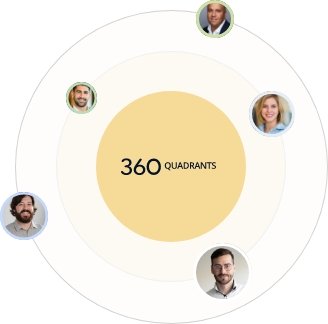A hybrid integration platform is a combination of on-premises and cloud-based system that is connected to communication network supporting the integration of on-premises, cloud, and hybrid endpoints. The platform narrows the gap between existing enterprise (databases, applications, and legacy systems) and cloud computing services (SaaS/PaaS, B2B, B2C, and BYOD).
The MicroQuadrant matrix provides information about the major players who offer the hybrid integration platform. It outlines the findings and analysis on how well each market vendor performs within the predefined MicroQuadrant criteria. The vendor evaluations are based on 2 broad categories: strength of product portfolio and business strategy excellence. Each category carries various criteria based on which the vendors were evaluated. The evaluation criteria considered under strength of product portfolio include the breadth and depth of product offering (on the basis of the industries that the vendors cater to, deployment models, and subscriptions), product feature and functionality, product quality and reliability, focus on product innovation (on the basis of R&D activities for new product innovations), and product branding. The evaluation criteria considered under business strategy excellence include vision alignment, effectiveness of organic growth strategy (on the basis of product developments and business expansions), mergers and acquisitions strategy (on the basis of partnerships, collaborations, and mergers and acquisitions), channel strategy and fit (on the basis of the channel partners that the vendors cater to), and geographic footprint (on the basis of geographic presence and revenue generated from different geographies).
Software AG, Informatica, Dell Boomi, MuleSoft, IBM, TIBCO Software, Oracle, and WSO2 are the leaders in the hybrid integration platform market and are recognized as the visionary leaders. IBM, Oracle, Software AG, and TIBCO Software have comprehensive offerings in the on-premises ESB. These vendors are migrating their products from the on-premises platform to the cloud platform to complement their on-premises footprints. They have a strong portfolio of services in the hybrid integration platform market. These vendors are marking their presence in the hybrid integration platform market by offering customized solutions as per the requirement of different industry verticals. These vendors have undertaken various growth strategies to advance consistently in the hybrid integration platform market.
Liaison Technologies, Red Hat, Microsoft, and Fiorano Software are recognized as the dynamic differentiators in the hybrid integration platform market. These vendors offer subscription-based models for the migration to the cloud. Their capability of developing multiple integration standards enables faster cloud migration and deployment. These vendors assist enterprises in delivering a reliable and scalable integration product. These vendors have an innovative portfolio of services. They also have an extensive network of channel partners and resellers to increase the deployment of their platform across a multitude of industry verticals. The dynamic differentiators have been consistently generating positive revenue growth in the hybrid integration platform market, and their market position is boosted by the organic and inorganic growth ventures undertaken by them.
SnapLogic, Axway, SEEBURGER, RoboMQ, Attunity, Cleo, and Actian are recognized as the innovators in the hybrid integration platform market. They possess innovative solutions to cater to the future integration demands. These companies are concerned about their product portfolio, and they have the robust potential to build strong business strategies for expanding their business and stay on par with the visionary leaders. These vendors have been consistently offering hybrid integration platform services to fulfill their customer demands. Innovators have been at the forefront for the deployment of innovative hybrid integration platforms.
Adeptia, Talend, Scribe Software, elastic.io, Built.io, and DBSync are recognized as the emerging companies in the hybrid integration platform market. Most of the emerging companies have undertaken multiple acquisitions to boost their sales capabilities across various regions and to offer integration platform services to a wide range of clients.



